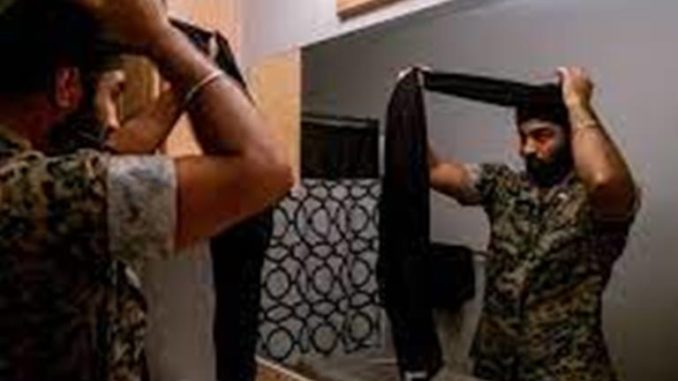
NEW YORK (TIP): A 26-year-old Sikh-American officer in the US Marines who has been allowed to wear the turban – the first person in the 246-year history of the elite force allowed to do so – but with a few limitations, plans to sue the Corps if he is not granted full religious accommodation, according to a media report.
“Almost every morning for five years, First Lieutenant Sukhbir Toor has pulled on the uniform of the United States Marine Corps. On Thursday, September 23, he also got to put on the turban of a faithful Sikh,” the report said.
Lt. Toor’s turban is a first in the 246-year history of the Marine Corps, which has almost never allowed deviations from its hallowed image, the report said. “I finally don’t have to pick which life I want to commit to, my faith or my country. I can be who I am and honor both sides,” Lt. Toor said in an interview. When Lt. Toor was promoted as Captain this spring, he decided to appeal. Lt. Toor’s case is the latest in a long-running conflict between two fundamental values in the United States military: “the tradition of discipline and uniformity, and the constitutional liberties the armed forces were created to defend,” the report said.
However, Lt. Toor, who grew up in Washington and Ohio and is the son of Indian immigrants, has been allowed to wear the Turban while on duty with limitations. He “can wear a turban in daily dress at normal duty stations, but not while deployed to a conflict zone, or when in dress uniform in a ceremonial unit, where the public could see it.” The report said Lt. Toor has appealed the restrictive decision to the Marine Corps commandant, and he says that if he does not get a full accommodation, he will sue the Corps.
“We’ve come a long way, but there is still more to go,” he said in the report. “The Marine Corps needs to show it really means what it has been saying about strength in diversity – that it doesn’t matter what you look like, it just matters that you can do your job.”
The Corps has maintained “uniformity was as essential to a fighting force as well-oiled rifles”.
“In order to build squads that will move forward in a combat environment where people are dying, a strong team bond is required,” Col. Kelly Frushour, a spokeswoman for Marine Headquarters, said in written responses to The Times on Lt. Toor’s case. “Uniformity is one of the tools the Corps uses to forge that bond. What the Corps is protecting is its ability to win on the battlefield, so that the Constitution can remain the law of the land.”
Lt. Toor’s request to wear the turban went all the way to “top Marine Corps authorities”. Their initial response in June was largely a denial of his request, the report said.
“In a stern response, one Marine Corps general warned that individual expression of that kind could fray the fabric of discipline and commitment that binds the Marines. It could erode the nation’s trust in the Corps. It could undermine combat effectiveness. It could cost lives,” the report said.
“The Corps cannot experiment with the components of mission accomplishment,” Lt. Gen. David A. Ottignon, the deputy commandant for manpower and reserve affairs, said in the response. “Failure on the battlefield is not an acceptable risk,” he added.
Lt. Toor said the limits meant, “I would have to either sacrifice my career or my ability to practice my religion”.
Lt. Toor appealed to the commandant of the Marine Corps, and the Corps agreed partially, allowing him to wear the turban with certain limitations, according to the report.
The report said that nearly 100 Sikhs currently serve in the Army and Air Force wearing full beards and turbans.
Lt. Toor had joined the US Marines after college in 2017, “knowing he would at least initially have to forgo the physical symbols of his faith”, but he was willing to make the sacrifice. “I felt there was a debt to be paid. My family came to this country seeking the American dream, and we got it,” he said in the report. Lt. Toor expressed worry that a tough position on beards and turbans in the Marine Corps will make Muslims, Sikhs and others less likely to serve in the force, the report said. “Sikh kids growing up might not be able to see themselves in uniform. Even if they want to serve, they might not think their country wants them,” he said in the report.





Be the first to comment